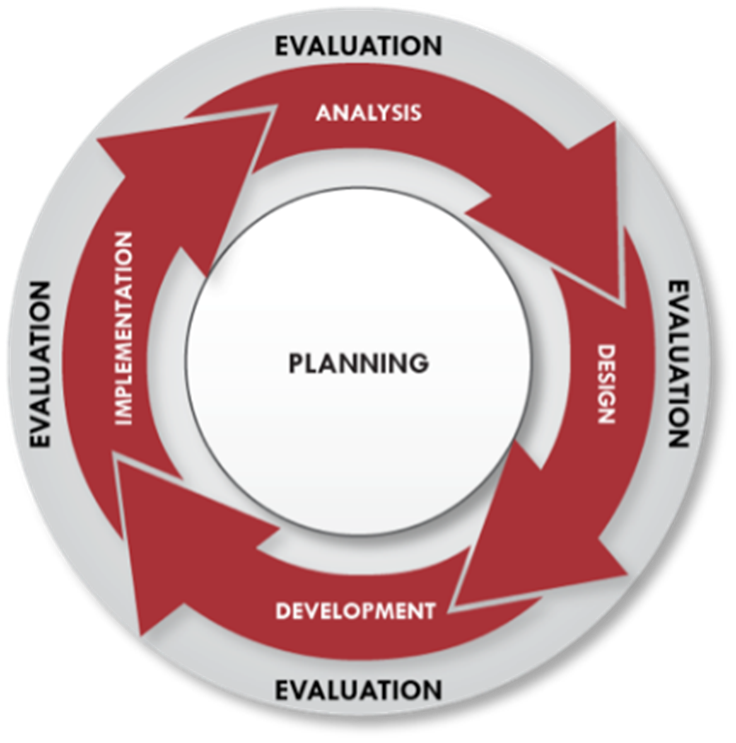Instructional Design Process
About Windwalker
Windwalker Group, LLC (Windwalker) is a Small Business Administration 8(a)-Certified Minority/Disadvantaged Business Enterprise (M/DBE), headquartered in Boston, MA. Founded in 1996, Windwalker has 25 years of experience in the private and public sectors, developing and delivering a diverse array of education and training products and services. We specialize in the development of training materials through our PADDIE model of design.
Determine Goal
There are many approaches available to us today for developing engaging and effective training. Training developers can create a training solution through the ADDIE Model of Instructional Design, Human-Centered Design Methodology, or the Agile process of Successive Approximation Model (SAM) for rapid prototyping. As with most engagements, the choice of approach will stem from what the client or customer is seeking in terms of budget, schedule, length of training, and the modalities of delivery, i.e., online, virtual ILT or traditional classroom or a blended approach using several.
For more than twenty years, Windwalker has applied and tailored its ISD process to a wide variety of courseware projects, including eLearning. Windwalker has modified and expanded its ISD process from a rigid, linear, iterative process that was originally aligned with DoD and military models to today’s dynamic, flexible collection of processes, procedures, techniques, tools, and decision points that incorporate the latest in adult learning theories, technological innovations, and industry best practices. We organize these elements within a cyclic framework of phases of the PADDIE (Planning, Analysis, Design, Development, Implementation, and Evaluation) model. We have added Planning to our ADDIE approach to emphasize the importance of a firm foundation from where to start any training project.
Windwalker adapts and applies this framework according to the specific needs of the requirements of each individual project. Any phase may be performed as appropriate for each task order assignment. This high degree of flexibility and the ability to tailor our ISD process accommodates any instructional development challenge and enables us to produce high quality, effective instructional materials in the most instructionally effective and cost-efficient manner possible.
Each of the ISD phases as they apply to our Instructional Design approach is briefly described below.
The Planning Phase
This phase is initiated immediately following the kick-off meeting for any project, large or small. During this phase, primary functions relative to project planning, organizing, and managing are established and executed. This phase culminates in the development of the Project Management Plan (PMP), which sets forth:
Project timelines and Milestones
Communications channels
Resource allocations
Meeting schedules
Key stakeholders.
The Analysis Phase
Windwalker approaches this phase as a collaborative work process, which involves:
Client Stakeholders
Instructional Developers
Subject Matter Experts
Working closely to identify the overall structure and key content elements of the training program or product. During the analysis phase Windwalker’s production specialists also gather technical requirements for the delivery platform, including LMS specifications and SCORM conformance.
The Design Phase
For all of our training projects, this phase builds upon the information collected in the analysis phase and is combined with our expertise in:
Adult learning theory
Generational learning
Learning retention
Instructional strategies
Multimedia production and Implementation
Program Evaluation
Instructional technology
This combination of art and science is merged to translate the collected data into an instructional blueprint for a highly engaging and effective learning program. This blueprint is the Course Design Plan (CDP). For online course creating, it is during this phase when we begin the production of the functional prototypes.
The Development Phase
This phase is when the instructional plans described in the approved design documentation are transformed into the actual courses. This phase may include:
Drafting of instructor guides
Developing presentation slides
Storyboarding
Producing multimedia elements
Device testing for responsiveness
Producing a draft of course materials.
It is during the development phase when Windwalker multimedia specialists will develop media elements such as audio files or video and animations. Audio, whether enhancement sound effects or course narration files. Animated infographics or video components are produced during this phase.
The Implementation Phase
In our approach, implementation kicks off the pilot testing with the target populations. We schedule a Pilot test for courses completed and approved. The instructional developers attend the test sessions to observe the course in action and be present to assist in any classroom issues or, in the case of online courseware, troubleshoot technical glitches. If time and/or project plan allows, developers may pull the testers together and conduct a focus group session to ask specific questions about the courses to illicit direct feedback. Upon completion of the Pilot test, our developers prepare test reports, which provide data and feedback from the testers. We meet with the stakeholders to present the report and make final decision on any changes or revisions that need to be made to the course to get it to the final version, ready to launch. Next, we will make final revisions to the courses and assist in uploading the program to its last hosting location (i.e., LMS).
Conducting registration
Reservation of Location and Facilities
Finalizing rosters
Reproduction of guide
Handouts and other materials
Notification emails are executed at this time
The delivery of the training itself is also part of the implementation phase.
The Evaluation Phase
Windwalker’s complete ISD process includes an Evaluation Phase that features the Kirkpatrick Evaluation Methodology, which offers four distinctly different levels of evaluation. These levels are customized and applied as required by the client. Those levels include:
Level One—Students are asked about their reaction to the training and how well they liked it. They are asked for their opinions on the content of the training, the ease of use and intuitiveness the GUI, and other aspects of the training.
Level Two—Students are tested on the content of the training to measure knowledge transfer. This effort is bolstered if pre-testing has occurred so we can compare the results from the course test to determine learning gains.
Level Three—Windwalker follows up with students and their managers a month or two after the training to measure changes in behavior resulting from the training. This shows whether students have a new or enhanced capability to perform skills covered in class while on the job.
Level Four—This level of the Kirkpatrick model focuses on the training’s impact on the organization. It seeks tangible results of the learning process in terms of reduced costs, improved quality, increased production, and the like. Windwalker has performed this level of evaluation for multiple clients.
The key element that our instructional designers and developers focus on is the flexibility and adaptability of our PADDIE approach. Depending on the project we will use all or parts of the process to complete the requirements at hand. We have even been able to adapt and incorporate elements of the other approaches, SAM, Human-Centered Design, Agile into our PADDIE process.
Instructional design approaches are toolboxes. You can use as many tools as needed to complete the job. You may need one, you may need the entire box, depending on the project. However, the important thing is that you have the tools. Our toolbox is the PADDIE model. It allows us to design training that meets the needs of the target population, at the time and place of that need, and validates the learning is taking place. Like most well-constructed things, a good foundation is the start of it all. Instructional design enables us to lay that foundation for effective and engaging training.
Our Work
We developed transportation-related anti-terrorism awareness training for the Department of Homeland Security.
We created award-winning training on the US Army’s substance abuse program, ensuring that soldiers struggling with addiction can get the help they need.
We built a training program specifically for the men and women protecting 21,000 miles of track, 529 stations and more than 31.2 million rail passengers.
We trained Amtrak employees to spot and report terrorist reconnaissance activity.
We helped Amtrak train first responders for train-related emergencies in their communities.
We trained the entire U.S. Postal Inspection Service on a new web-based information system.
We developed employee engagement content for more than 50,000 United States Postal Service employees.
Windwalker Awards
Communicator Award: Outstanding Online Learning - Department of Interior; No FEAR Act eLearning Program
AVA Digital Award GOLD Winner - Department of Interior; No FEAR Act eLearning Program
Hermes Creative Awards GOLD Winner - Department of Interior; No FEAR Act eLearning Program
Communicator Award: Outstanding Online Learning – Amtrak – Frontline Security Awareness
AVA Digital Award GOLD Winner - Amtrak – Frontline Security Awareness
Hermes Creative Awards GOLD Winner – FDIC Money Smart Computer-based Instruction
With the implementation of this strategy, Windwalker aims to be your complete Instructional Design partner throughout any project in any phase of development. For more information on any of our value-added services, please reach out to our Training Practice Lead, Jim Helein at jim.helein@windwalker.com




